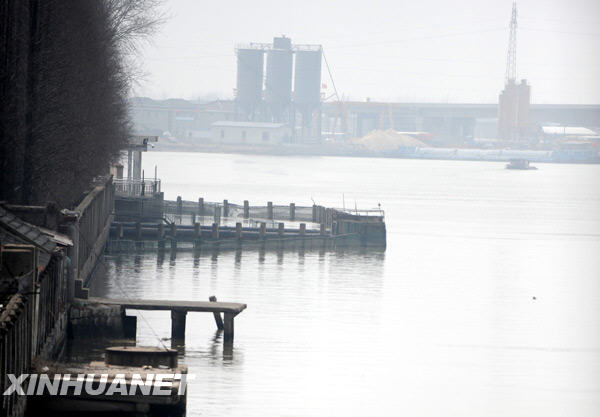A water plant that was closed for three days because of contamination by the disinfectant phenol resumed operations at 2 a.m. Monday, according to local authorities in east China's Jiangsu Province.
 |
|
Photo taken on February 21, 2009 shows the source of the polluted Chengxi water plant in Yancheng, east Jiangsu province.
|
The West City Water Plant of Yancheng City halted water supplies Friday morning after the water was found to be contaminated. At least 200,000 residents were deprived of tap water, said a spokesman for the Yancheng city government.
Tests showed the water was drinkable on Sunday, however, the plant continued hourly tests to monitor for pollution.
Zhang Shouhua, the West City Water Plant manager, said water pressure would return to normal Monday afternoon, restoring service to users on high floors.
The Yancheng government informed residents by text messages that the water was back on, and it advised people to run the water for 20 minutes to clean the pipes of pollutants.
"We have started using the water to cook after receiving the text message," said a resident surname Lu, who lives on the fourth floor in the Changba Compound.
The Yancheng China Water Co., which manages the plant, said it would supply free water for up to a month to compensate customers for the disruption.
Local authorities said phenol was illegally discharged from Biaoxin Chemical Co. into the Xinyanggang River, which supplies the plant's water.
Phenol is used in the production of resins, plastics, and pharmaceuticals and in diluted form as a disinfectant and antiseptic.
Police have detained Hu Wenbiao, the chemical company's legal representative, and Ding Yuesheng, the manager.
The West City Water Plant supplies 70,000 tonnes of water, or half the water consumed by the city of more than 1.5 million residents, per day.
An unaffected tap plant in the east of the city raised its production from 100,000 tonnes to 120,000 tonnes to meet demand, but most people relied on bottled water during three-day stoppage.
The city government decided to halt production by chemical factories in the protected water zones and will relocate factories as soon as possible, the spokesman said.